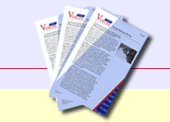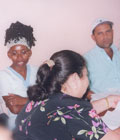
Peers Learn from Peers: An Alternative Approach to Supervision
“Without Rigoberto I would not have been able to form the health committee, since the community thought I should solve my own problems. Rigoberto helped them change their perspective and see how a committee can help.”
In her work as an auxiliary nurse in Gualaco, Honduras, Maritza de la Luz Cálix benefits from the community organizing skills of her fellow nurse, Rigoberto Estrada. His assistance is fostered by a peer support network designed by the PRIME II Project to encourage visits among nurses who were working alone in remote health posts and meeting infrequently with their formal supervisors.
Recognizing that traditional supervision systems are often inadequate in low-resource areas, PRIME II is comparing approaches for supporting primary health care providers in the Olancho region of Honduras. In the peer support model, rural nurses get together periodically to review their performance, solve problems, and mutually reinforce their knowledge and skills in family planning and reproductive health. As demonstrated by Estrada’s role in forming health committees in six communities, peer support networks enable providers to improve their infrastructure by drawing on their collective strengths.
PRIME II has worked in Honduras since 2000, assisting the Ministry of Health with health sector reform in collaboration with Abt Associates’ Partnerships for Health Reform Project. Using the Performance Improvement approach, PRIME helped to conduct a performance needs assessment of 140 health facilities in the Olancho region. The study found the root causes of primary providers’ performance gaps to be low motivation, unclear job expectations, and insufficient knowledge and skills in specific content areas. Stakeholders chose supportive supervision as the best intervention for addressing all these problems simultaneously.
To identify the most effective way to complement and strengthen ongoing supervision, PRIME is analyzing the costs and results of two approaches: external supervision and external supervision supplemented by peer support. External supervision skills have been enhanced through a workshop on supportive supervision techniques attended by 38 supervisors from both groups. Scheduled monthly meetings between supervisors and providers now take place more regularly, with a sharper focus on strengthening the factors that influence performance.
An additional 122 providers and supervisors learned how to support their peers and use a quality measurement tool to assess the quality of services they deliver. After returning to their health posts, participants collaborated to apply the tool and identify problem-solving interventions. These include starting the community health committees that enable primary providers to dialogue with their clients and neighbors and receive more support from their communities.
PRIME II and the Ministry of Health will evaluate the two supportive supervision approaches in June. Early results suggest that the peer support visits between auxiliary nurses are an especially effective and efficient means of bolstering supervision and improving provider performance. As one participating nurse emphasized, “We all lack information and maybe our colleagues have it. Peer support is very important.”
The PRIME II Project works around the world to strengthen the performance of primary-care providers as they strive to improve family planning and reproductive health services in their communities.
PRIME Voices #18, Honduras: An Alternative Approach to Supervision, 4/22/03.
|












